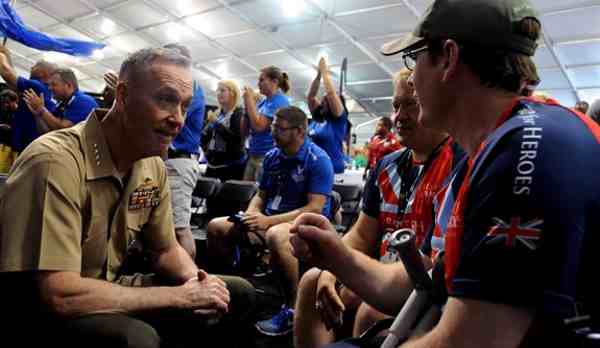U.S. Faces Fresh Threats from Russia and China

Russia, China, Iraq, Syria, Yemen, North Korea are just a few of the situations that the next chairman of the Joint Chiefs of Staff will have to deal with.
The President’s choice -– Marine Corps Gen. Joseph F. Dunford Jr. -– discussed these and more during his confirmation hearing Thursday.
Dunford, currently the commandant of the Marine Corps, spent almost three hours before the Senate Armed Services Committee. If confirmed by the Senate, Dunford would succeed Army Gen. Martin E. Dempsey on Oct. 1.
Noting the complexity and volatility of the current security environment, Dunford said there are challenges around the world, in space and in the cyber domain.
“While dealing with these and other issues,” he added, “we also face the need to restore readiness and modernize the joint force in the context of fiscal challenges and budget uncertainty.”
If he’s confirmed, the general told the committee, “Iraq, Afghanistan and the places where our young men and women are in harm’s way would be the first places I would go to visit.” “This issue, because it’s so important, would be one issue that I would look into personally,” he said.
While much of his testimony covered the situation in Iraq and Syria with regard to the Islamic State of Iraq and the Levant, Dunford bluntly told the senators that Russia poses the greatest threat to the United States.
“In Russia, we have a nuclear power,” he said. “We have one that not only has capability to violate sovereignty of our allies and … to do things that are inconsistent with our national interests, but they are in the process of doing so.”
Russia poses an existential threat to the United States, he said, “and if you look at their behavior, it’s nothing short of alarming.”
While Russia leads the list, the general said, if he had to “rack and stack” his concerns, China would be second. But China’s growing military capability doesn’t necessarily mean it is a current threat, he added.
“It doesn’t mean we view China as an enemy,” he explained. “But … as somebody in uniform, I get paid to look at both somebody’s intent and their capability,” he said. “So when I look at Chinese capabilities relative to our interest in the Pacific, I’d have to consider China as an area of concern for security — again, as distinct from a threat.”
North Korea’s nuclear program and missile technology is clearly a threat, Dunford said, followed by ISIL, but he stressed that addressing the threats is more complicated than ticking off a checklist.
In combating ISIL, Dunford said, he is comfortable with the current strategy that stresses the whole-of-government approach. Of the nine lines of effort, the Defense Department has two: to deny the enemy sanctuary and to build Iraqi and Syrian forces. The other lines of effort are managed by the State Department, the Treasury Department, law enforcement and other agencies.
The DoD effort is really buying time and space for those other seven lines of effort to work, Dunford said.
“To be quite honest, I don’t see how we can have an enduring success unless those other seven lines of effort are addressed,” he said, “and they are, in the final analysis, more important.”
In the picture above: Gen. Joseph F. Dunford, Jr., Commandant of the Marine Corps, talks to British Forces medically retired Maj. David Dent and Lance Cpl. Mark Martin-Davy before the medal presentation for the shooting competition during the 2015 DoD Warrior Games on Marine Corps Base Quantico, Va., June 26, 2015. DoD photo by Shannon Collins





